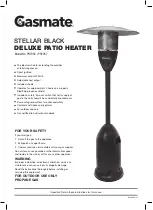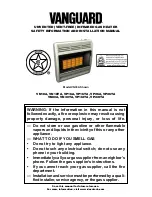
12
© 2021 United States Stove Company
NEVER OPERATE THIS PRODUCT WHILE UNATTENDED
OPERATION INSTRUCTIONS
CAUTIONS: HOUSE FIRE HAZARDS
• DO NOT STORE WOOD ON FLOOR PROTECTOR,
UNDERNEATH STOVEPIPE(S) OR ANYWHERE
WITHIN CLEARANCES TO COMBUSTIBLE
SURFACES SPECIFIED FOR THIS APPLIANCE.
• NEVER OPERATE WITH SECONDARY TUBES,
FIBERBOARD, OR INSULATION REMOVED.
WARNING: EXPLOSION HAZARD
• NEVER USE CHEMICALS, GASOLINE, GASOLINE-
TYPE LANTERN FUEL, KEROSENE, CHARCOAL
LIGHTER FLUID, OR SIMILAR FLAMMABLE
LIQUIDS TO START OR “FRESHEN UP” A FIRE IN
THE APPLIANCE.
• KEEP ALL FLAMMABLE LIQUIDS, ESPECIALLY
GASOLINE, OUT OF THE VICINITY OF THE
APPLIANCE - WHETHER IN USE OR IN STORAGE.
OPERATING SAFETY PRECAUTIONS
• NEVER OVERFIRE THIS APPLIANCE BY
BUILDING EXCESSIVELY HOT FIRES AS A
HOUSE/BUILDING FIRE MAY RESULT. YOU ARE
OVERFIRING THE APPLIANCE IF IT BEGINS TO
GLOW OR TURN RED.
• NEVER BUILD EXCESSIVELY LARGE FIRES IN
THIS TYPE OF APPLIANCE AS DAMAGE TO THE
FIREBOX OR SMOKE LEAKAGE MAY RESULT.
• HOT WHILE IN OPERATION. KEEP CHILDREN,
CLOTHING, AND FURNITURE AWAY. CONTACT
MAY CAUSE SKIN BURNS. DO NOT TOUCH THE
APPLIANCE UNTIL IT HAS COOLED.
• PROVIDE ADEQUATE AIR FOR COMBUSTION
TO THE ROOM WHERE THE APPLIANCE IS
INSTALLED.
• INSPECT CHIMNEY LINER EVERY 60 DAYS.
REPLACE LINER IMMEDIATELY IF IT IS RUSTING
OR LEAKING SMOKE INTO THE ROOM.
• ATTEMPTS TO ACHIEVE HEAT OUTPUT
RATES THAT EXCEED HEATER DESIGN
SPECIFICATIONS CAN RESULT IN PERMANENT
DAMAGE TO THE HEATER.
WOOD STOVE UTILIZATION
Your heating appliance was designed to burn well
seasoned natural wood only; no other materials should
be burned. Any type of well seasoned natural wood
may be used in your stove, but specific varieties have
better energy yields than others. Higher efficiencies
and lower emissions generally result when burning air
dried seasoned hardwoods, as compared to softwoods
or too green or freshly cut hardwoods. The following
resources can assist in learning the burn characteristics
of various species of wood:
http://firewoodresource.
com/firewood-btu-ratings/
; or
https://forestry.usu.edu/
forest-products/wood-heating
. The operation of this
wood heater in a manner inconsistent with the owner’s
manual will void your warranty and is also against federal
regulations. Waste and other flammable materials should
not be burned in your stove. DO NOT BURN:
1. Garbage;
2. Lawn clippings or yard waste;
3. Materials containing rubber, including tires;
4. Materials containing plastic;
5. Waste petroleum products, paints or paint thinners,
or asphalt products;
6. Materials containing asbestos;
7. Construction or demolition debris;
8. Railroad ties or pressure-treated wood;
9. Manure or animal remains;
10. Saltwater driftwood or other previously salt water-
saturated materials;
11. Unseasoned wood; or
12. Paper products, cardboard, plywood, or particleboard.
The prohibition against burning these materials does
not prohibit the use of fire starters made from paper,
cardboard, sawdust, wax, and similar substances to
start a fire in an affected wood heater.
Burning these materials may result in the release of toxic
fumes or render the heater ineffective and cause smoke.
Deadwood lying on the forest floor should be considered
wet and requires full seasoning time. Standing deadwood
can usually be considered to be about 2/3 seasoned.
Smaller pieces of wood will dry faster. All logs exceeding
6” in diameter should be split. The wood should not be
stored directly on the ground. Air should circulate through
the logs. A 24” to 48” air space should be left between
each row of logs, which should be placed in the sunniest
location possible. The upper layer of wood should be
protected from the element but not the sides. A good
indicator of if the wood is ready to burn is to check the
piece ends. If cracks are radiating in all directions from
the center then the wood should be dry enough to burn.













































